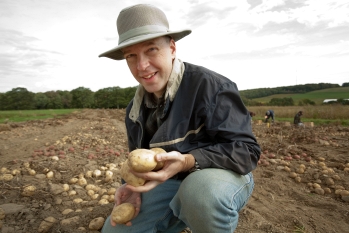COVER STORY SIDEBAR
Department with a singular vision of plant breeding with genetics
Cornell corn breeder Margaret Smith can confidently say her Department of Plant Breeding and Genetics is the best of its kind in the nation – and not just because it happens to be the only one.

Walter De Jong, associate professor of plant breeding and genetics. See larger image
The National Research Council recently gave the department's graduate program its highest score, based on a poll of plant sciences peers from 118 institutions. And over the last four years, the department has brought in an average of $4 million a year in grants.
"Even though our department is quite small, Cornell Plant Breeding and Genetics has a global reputation for high-quality research and instruction," says Mark Sorrells, department chair.
Its influence is far-reaching, with graduates and collaborators scattered across several continents, and plant varieties growing in fields from Freeville, N.Y., to Frankfurt, Germany.
While other institutions incorporate breeding into their curriculum, with faculty pulled from such areas as plant science or agronomy, Cornell is the only university to dedicate breeding and genetics within a single department.
And while Cornell is a leader in unraveling molecular mysteries and sequencing genomes, it is unusual in maintaining its focus on the application of science at a time when many other programs have abandoned product development and field testing in favor of the more grant-attractive genomics research, Smith says.
"One of our historic strengths has been maintaining that breadth, from basic research to application," she says. "We bring the best of science to bear on the development of new germplasm and seed varieties."
While Wojciech Pawlowski unravels the mechanisms of meiotic cell division and Martha Mutschler-Chu develops novel ways to eliminate sublethal genes and accelerate the breeding process, for example, Larry Smart works to establish willow as a viable biofuel crop – one of only four willow breeding programs worldwide.
Some projects focus on such problems specific to New York state as Walter De Jong's development of potatoes resistant to golden nematode, a soil-borne pathogen present only in the state.
Other projects have global relevance: Sorrells and Professor Ronnie Coffman hope to alleviate world food shortages by developing wheat varieties resistant to the Ug99 wheat stem rust fungus.
Reducing dependence on chemical pesticides by developing plant resistance to pathogens and pests is an area of special emphasis throughout the department. High yield, enhanced quality and suitability for sustainable agriculture are other goals.